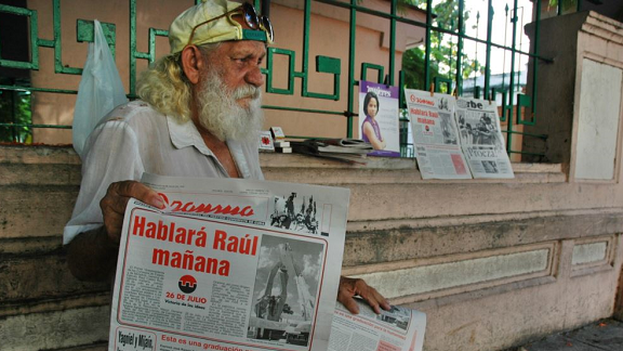
![]() 14ymedio, Reinaldo Escobar, 16 April 2017 — The term secretismo (secretiveness), to refer to the absence or delay of certain information of public interest in the Cuban official media, began to be used first among critics of the system, until it came to appear in the speeches of the highest officials of the government.
14ymedio, Reinaldo Escobar, 16 April 2017 — The term secretismo (secretiveness), to refer to the absence or delay of certain information of public interest in the Cuban official media, began to be used first among critics of the system, until it came to appear in the speeches of the highest officials of the government.
The list of what the official media has never reported, or only reported with an inexplicable delays, deserves a thorough study, which in addition to filling thousands of pages, would serve to better understand the country’s most recent history.
Among the headings to organize the list of the omitted would be: deaths, destitutions, desertions, economic failures, military defeats, diplomatic fiascos, serious damage to nature, consequences of mistakes made, and even data on the rates of suicides, divorces or emigration, along with references to the country’s debt or to the decrease in Gross Domestic Product. All this and more has fallen into that black hole of disinformation.
The temptation to offer some examples would lead us to mention, among other pearls, the forced relocation of peasants from the Escambray in the 1960s, the disastrous effects of the whim of trying to produce 10 million tons of sugar in 1970, the collapse of the military operation in Granada in 1983, the consequences that the epidemic of polyneuritis brought in the most difficult years of the Special Period, and more recently the clinical causes of Fidel Castro’s death.
It has been this way since the days when Party ideologue Carlos Aldana pontificated on the need to have “critical, militant and creative journalism”
The response that has often been given to criticism of secretismo has ranged from the most tenacious justification, based on being a country threatened by the most powerful power in the world, to the pretense of blaming the mid-level cadres.
It has been this way since the days when party ideologue Carlos Aldana pontificated on the need to have “critical, militant and creative journalism,” right up to our time when Raúl Castro himself advised before the parliament: “It is necessary to put on the table all the information and the arguments that underlie each decision and step, to suppress the excess of secretismo to which we have habituated ourselves during more than 50 years of enemy encirclement.”
These self-critical pretenses have had the peculiarity of appearing in cycles, which has given the permanent impression of being on the eve of an always timid and incomplete opening. The journalistic guild has been perhaps the most victimized with these frequent promises, made in Congresses of the Union of Cuban Journalists (UPEC) or in informal meetings with the press.
When it seems that “now we are going to end the secretismo” the promise of promulgating a new electoral law disappears, the head of the commission in charge of implementing the Party’s guidelines disappears, and the sale of premium gasoline is suspended without any media of the official press daring to review or comment on what happened.
Even the euphemism of using the word “secretismo” to refer to what strictly must be called censorship, only serves to cover up what is supposed to be revealed. It is a crime of linguistic injury whose result lies in keeping in obscurity what outwardly is illuminated.
